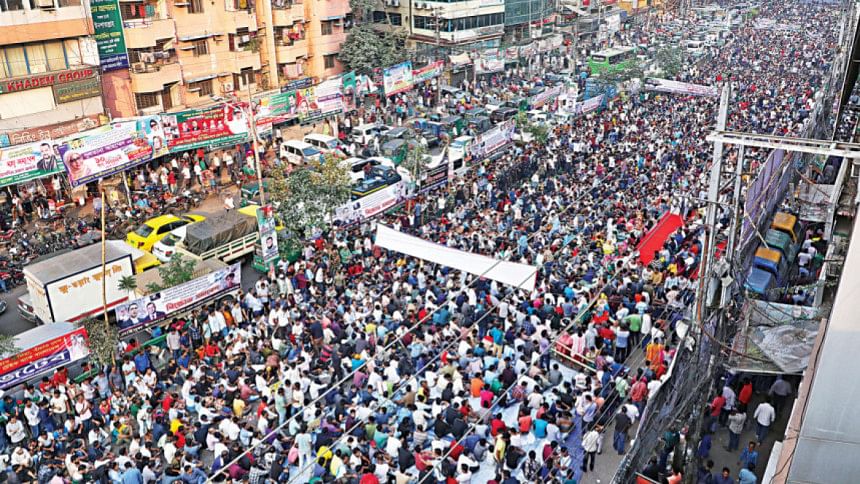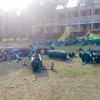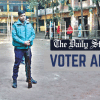BNP has lost its momentum

The wave of momentum that the BNP rode on leading up to their rally on December 10 last year and its immediate aftermath seems to have fizzled out. The party leadership is clearly uncertain about the next course of action as the next parliamentary elections draw closer.
While some may wonder if BNP has failed to capitalise on its goodwill and momentum, political commentators say it is not at all unusual for the main opposition camp, which aspires to take office by toppling the incumbents, to lose steam midway.
Elected to office three times since 1991, BNP saw its public programmes gaining traction as it started talking about issues such as the rising prices of food, fuel and electricity. On top of that, when a few of their activists and leaders were killed, the crowd started overflowing. It was at this point that the party started holding divisional rallies in October last year.
The predictable obstruction put up by the ruling party in every possible way, at times aided by state apparatuses, only betrayed their desperation to encumber the BNP and throttle its campaign. But that backfired, and BNP's momentum with public support seemed to grow, culminating at the December 10 rally. In stark contrast to BNP's previous programmes – the vicious arson attacks of 2013 and 2014 to prevent the 2014 elections – this time, the campaign was noticeably peaceful.
The reason for BNP's campaign gaining public traction last year was that it was the first time in many years that the party raised issues relevant to the people instead of those relevant to the party's own interest – for instance, increasing food prices instead of the reinstatement of caretaker government system or the release of party chief Khaleda Zia. In fact, their failure to address issues that affect people's lives is often seen as one of the serious strategic mistakes the party has made in the past.
So, when the BNP planned to hold a rally in Dhaka, it was riddled with complications. The city authorities and police did not agree to the party's choice of venue. Party leaders and activists were locked up on flimsy charges, the party office was raided and major transport routes were blocked to keep people from expressing their solidarity with the BNP. Pundits think the party's obsession with its venue of choice took away the focus from the actual rally, which did not meet the expectations of the workers, especially given the build-up at the divisional rallies. The momentum was further dampened when, immediately after the rally, the party became rather engaged with releasing its leaders and activists from jail.
Since then, the BNP has been trying to regain its pace. The party announced a number of fresh protests, including human chains, hunger strikes and processions, in Dhaka and at the grassroots level. Here, too, the party faced obstacles as the ruling Awami League countered them with their own programmes almost everywhere on the same dates. This strategy of counter programmes provided the ruling party with the excuse to take to the streets and gradually defuse the opposition camp's campaign.
BNP also held a number of meetings with its grassroots leaders and activists, including former and incumbent local government representatives, to know their views about the next course of action for the party. They were unanimous in continuing the campaign and gear it up in Dhaka, where the party has always failed to seize the initiative ever since its election debacle in 2008.
The reason for BNP's campaign gaining public traction last year was that it was the first time in many years that the party raised issues relevant to the people instead of those relevant to the party's own interest – for instance, increasing food prices instead of the reinstatement of caretaker government system or the release of party chief Khaleda Zia. In fact, their failure to address issues that affect people's lives is often seen as one of the serious strategic mistakes the party has made in the past.
Last year, the BNP was able to motivate its workers and cash in on the sentiments of the masses, but even after that it failed to wage a sustained campaign, which frustrated many of its workers. Then, just as the party was about to come up with fresh programmes, Ramadan arrived, rendering all politics to the confines of the iftar table.
With Eid holidays over, the country is bracing for the upcoming city corporation elections in five major cities, which will be a precursor to the general elections that are scheduled for late December this year or early January next year. Observers believe that political campaigns hardly get traction during local government elections. Although BNP has warned its workers against running in these elections, it would still be unwise to initiate a campaign when everyone's eyes are on the city polls.
And following the city polls, we will be in the thick of monsoon when it will be hot, humid and wet, when street campaigns typically do not fare well.
Despite that, the BNP is still chalking out fresh programmes to mobilise its leaders and supporters and also the masses to stand behind its demand for a nonpartisan interim government in order to hold elections. While observers say that the lost momentum is rather difficult to regain, to make matters worse for them, the Awami League has managed the electricity problem rather well, and power outages remain rather few compared to the looming apprehension through the winter months.
Vladimir Lenin wrote about the crisis in his party in his book One Step Forward, Two Steps Back. But for BNP, it is more like one step forward, several steps back.
Mohammad Al-Masum Molla is chief reporter at The Daily Star.

 For all latest news, follow The Daily Star's Google News channel.
For all latest news, follow The Daily Star's Google News channel. 













Comments